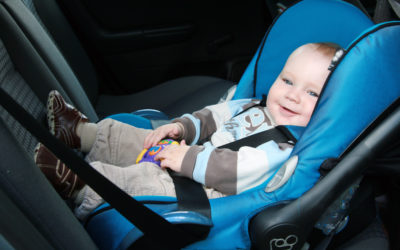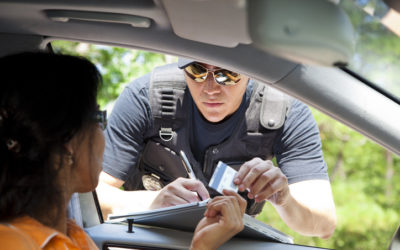What to Do When You Get Pulled Over | DriveSafe Online®
No one enjoys the thought of getting pulled over by a police officer. It can be a detriment to your entire day if they end up giving you a ticket.
Maybe you were speeding through a construction zone in an effort to get to work on time. Perhaps you weren’t paying attention to the stop sign that you drove straight through.
Whatever the case might be, you now have to properly handle the ordeal of communicating with the cop. How can you best do that?
Here is what to do when you’re pulled over by police. Take all of these steps and memorize them for a rainy day.
1. Find a Safe Place to Pull Over
The process to properly handle getting pulled over begins as soon as you see the flashing lights in your rear view mirror.
You need to safely (but as quickly as possible) get over to the side of the road where you and the police officer are out of harm’s way. That starts by making your way over to the right side of the road. Never turn left to pull into a parking lot or side street. By doing so, you put yourself and the officer in danger of being hit. The last thing you want is to get into a car accident. Additionally, you could be issued another ticket for reckless driving by turning left instead of right.
If it is nighttime, find a well-lit area to pull over where you can see the officer and they can see you. Use your turn signals to indicate where you intend on bringing your car to a complete stop. The better you handle this, the better your encounter with the policeman or policewoman will be.
DRIVESAFE ONLINE DEFENSIVE DRIVING COURSES
Easy to Complete. Receive an Insurance Discount. Money-Back Guarantee!
Mobile-friendly viewing
Fully narrated video with closed captioning
Intelligent bookmarking to start/stop when you want
99% passing rate on user’s first attempt
Certificate emailed immediately after completion
Only $24.95
1-HOUR
6-HOUR
2. Turn the Car Off
The only way that the police officer can be sure you’re not going to try and take off (even if you’ve come to a complete stop) is to turn your car off.
Slowly bring your car to a complete stop, roll down your window (to talk with the cop), quickly put the car into park, turn on your hazard lights, and turn the ignition off.
It’s important not to take your keys out of the ignition or make any other additional steps. Your car being turned off is indication enough, no need for further movement.
While you might not think it, pulling someone over (even for a simple traffic violation) is highly stressful. For all they know, you could have a gun on you. They’re trained to remain alert, so do your part to calm the situation down.
3. Place Your Hands on the Wheel
As soon as you turn the car off, you should place your hands on top of your steering wheel where the officer can see them.
Don’t worry, as long as your car is turned off, they won’t take this as a sign that you’re trying to drive off.
Remain as still as you possibly can and keep your head looking forward until the officer kicks the conversation off. As soon as they start talking to you, try to meet their eyes and answer when spoken to.
It’s important to remember that you have the right to remain silent. All that you technically have to do when being pulled over is provide the officer with your driver’s license, car registration, and proof of your insurance.
Other than that, stay calm and keep conversation light in order to avoid incriminating yourself. If the officer asks the standard “do you know why I pulled you over?”, respectfully say “no”.
4. Request Your Actions to the Officer
Remember, the officer has been trained to expect almost anything. That’s why it is very important for you not to make any sudden motions.
The officer is going to ask you for your license, proof of insurance, and registration at some point. After they stop talking, tell them where those items are and how you’re going to retrieve them.
For example, if your proof of insurance or wallet is in the glove compartment, then tell them and wait for their nod to reach for it.
If you have your proof of car insurance on your phone, let the officer know and they’ll give you more time to find it. They might even go back to the car with your license and registration while you pull up your proof of insurance.
If you’re unsure of what qualifies as proof of insurance, then ask the officer and they’ll be happy to help you out.
5. Follow All Their Instructions to a “T”
It doesn’t matter what the policeman or policewoman asks you to do, be sure to do it to the best of your ability.
More importantly, follow all of their instructions with as much respect as possible. Even if they’re teetering on the impolite side with how they’re talking to you, don’t give them the same treatment.
Answer everything with “ma’am” or “sir” at the end of it and try to keep the situation as calm as you can.
It’s understandable if you’re nervous, everyone gets nervous while being pulled over. Heck, even the officer is probably a little nervous. So just do your best to be a respectful citizen and everything will work out well.
As long as you’re respectful, the worst thing that can happen is you receive a ticket for what they pulled you over for. If you’re not respectful, then the worst-case scenario can become much more difficult.
Pulled Over by Police? Know Your Rights!
It’s important to know your rights when you get pulled over by police. You don’t have to answer every question that they ask you.
If for some reason you don’t feel safe, call 911. Maybe the patrol car is unmarked, or the person doesn’t have appropriate uniform or badge to identify as a police officer. Whatever the reason, you should call 911 and explain the situation if you feel you are in danger.
The dispatcher can let you know if an actual officer is conducting the stop. If not, stay on the line and in your car until a police officer arrives.
Keep in mind that if you’re pulled over, you may receive a traffic ticket, which could increase your car insurance. Don’t panic. There are ways you can clean up your driving record and keep your insurance premiums from skyrocketing. Be sure to read this article on how to save on auto insurance.
If you’ve received a traffic ticket, been court-ordered for defensive driver school, or have had a spike in car insurance, our defensive driver courses can help.
Other posts you might enjoy:
We Believe in Nashville
Our thoughts are with all those in Nashville and across the great state of Tennessee affected by the recent tornadoes. The safety of our DriveSafe Online family, customers and partners is our primary concern. Tennessee Governor Bill Lee called for residents to stay...
Child Passenger Safety Regulations: A State-By-State Guide
Your State-By-State Guide to Child Passenger Safety Regulations Child passenger safety regulations are in place because a leading cause of death for children, one in every four, is driving-related accidents. Each one of these deaths is a terrible tragedy, but you may...
Will A Speeding Ticket Affect My Insurance?
By Patrick Mileham DriveSafe Online Contributing Writer Speeding tickets are part of your driving record so they may increase the amount you pay for insurance. That’s the bad news. The good news is there are several factors that must occur to actually trigger a rate...
Your Road to Savings

Patrick M. is Editorial Director for the always expanding DriveSafe Online library of courses. With over two decades of experience developing award-winning training, he now focuses on innovating online driver safety training. Pulling from his background in journalism, he steers the wheel behind the creation of top-tier content that promotes a better journey—whether on the digital highway of learning or the real roads we travel every day.


